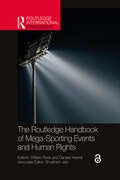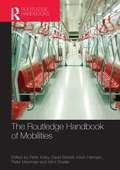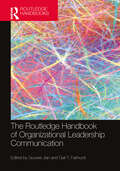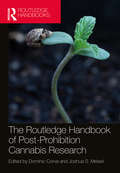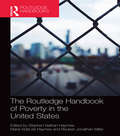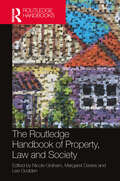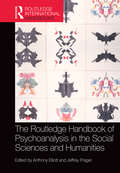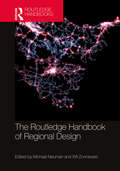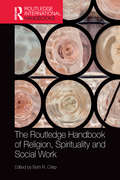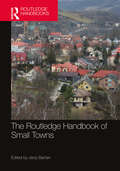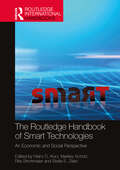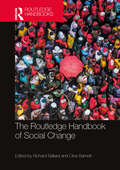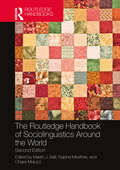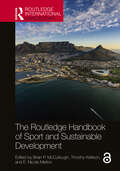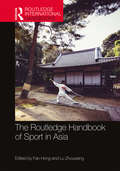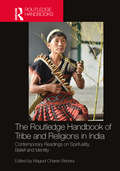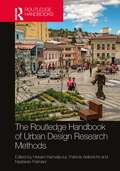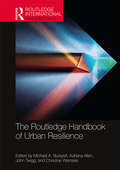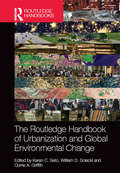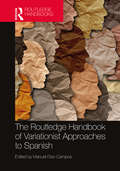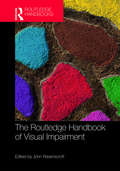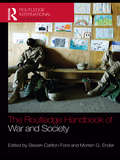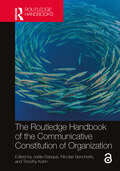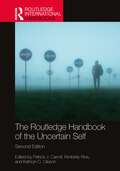- Table View
- List View
The Routledge Handbook of Mega-Sporting Events and Human Rights (Routledge International Handbooks)
by William Rook Daniela Heerdt Shubham JainThe Routledge Handbook of Mega-Sporting Events and Human Rights is the first book to explore in depth the topic of mega-sporting events (MSEs) and human rights, offering accounts of adverse human rights impacts linked to MSEs while considering the potential for promoting human rights in and through the framework of these events.Drawing on the contributions of an international group of leading researchers, practitioners and advocates, the book introduces key concepts in human rights and considers how they relate to ethical, social, managerial and governance issues in contemporary MSEs, from inclusion and welfare to corruption and sustainability. It examines the role of key stakeholders in the delivery of MSEs, including organising committees, sport governing bodies, governments, athletes, sponsors and broadcasters, as well as the role of activists and advocates, and presents historical and contemporary case studies of human rights as an active issue in MSEs. The book provides new perspectives on human rights as a lens for understanding modern sport and as a guiding principle for responsible sport that protects the interests of individuals and communities, as well as offering guidance on best practice.It is essential reading for all advanced students, researchers, practitioners, policymakers and stakeholders with an interest in organisation and delivery of MSEs, as well as general sport management, sport policy, sport governance, the ethics of sport, event management, political science, development studies, ethical business or the significance of sport in wider society.
The Routledge Handbook of Mobilities
by Kevin Hannam Mimi Sheller Peter Merriman Peter Adey David BissellThe 21st century seems to be on the move, perhaps even more so than the last. With cheap travel, and more than two billion cars projected worldwide for 2030. And yet, all this mobility is happening incredibly unevenly, at different paces and intensities, with varying impacts and consequences to the extent that life on the move might be actually quite difficult to sustain environmentally, socially and ethically. As a result 'mobility' has become a keyword of the social sciences; delineating a new domain of concepts, approaches, methodologies and techniques which seek to understand the character and quality of these trends. This Handbook explores and critically evaluates the debates, approaches, controversies and methodologies, inherent to this rapidly expanding discipline. It brings together leading specialists from range of backgrounds and geographical regions to provide an authoritative and comprehensive overview of this field, conveying cutting edge research in an accessible way whilst giving detailed grounding in the evolution of past debates on mobilities. It illustrates disciplinary trends and pathways, from migration studies and transport history to communications research, featuring methodological innovations and developments and conceptual histories - from feminist theory to tourist studies. It explores the dominant figures of mobility, from children to soldiers and the mobility impaired; the disparate materialities of mobility such as flows of water and waste to the vectors of viruses; key infrastructures such as logistics systems to the informal services of megacity slums, and the important mobility events around which our world turns; from going on vacation to the commute, to the catastrophic disruption of mobility systems. The text is forward-thinking, projecting the future of mobilities as they might be lived, transformed and studied, and possibly, brought to an end. International in focus, the book transcends disciplinary and national boundaries to explore mobilities as they are understood from different perspectives, different fields, countries and standpoints. This is an invaluable resource for all those with an interest in mobility across disciplinary boundaries and areas of study.
The Routledge Handbook of Organizational Leadership Communication (Routledge Handbooks in Communication Studies)
by Gail T. Fairhurst Guowei JianThis handbook captures a rapidly developing body of scholarship to map out the terrain of leadership communication and stimulate interdisciplinary dialogue among leadership communication scholars for future research. The Routledge Handbook of Organizational Leadership Communication surveys various areas of leadership communication, critically assesses their development, and proposes guidance for future research. It begins by addressing prominent theories or emerging theoretical perspectives that help conceptualize leadership communication, ranging from collective leadership approaches and critical perspectives to theories of practice and communicative constitution of organization. The second section focuses on reviewing the latest research on leadership communication in various organizational contexts, such as work teams, hybrid and virtual work contexts, and interorganizational collaboration. Informed by diverse theoretical perspectives, chapters in the final section examine the practice of leadership communication in dealing with both common and novel organizing challenges and processes, for example, the formation and execution of organizational vision and strategies, the use of emerging media technologies, and organizational decision making.The handbook will be an indispensable resource for researchers and advanced students in leadership communication and leadership studies and practicing managers and consultants in leadership and communication training and development.
The Routledge Handbook of Post-Prohibition Cannabis Research
by Dominic Corva Joshua S. MeiselThe place of cannabis in global drug prohibition is in crisis, opening up new directions for socially engaged cannabis research. The Routledge Handbook of Post-Prohibition Cannabis Research invites readers to explore new landscapes of cannabis research under conditions of legalization with, not after, prohibition: "post-prohibition." The chapters are organized into five multidisciplinary sections: Governance, Public Health, Markets and Society, Ecology and the Environment, and Culture and Social Change. Case studies from the United States, Uruguay, Morocco, and the United Kingdom show readers alternative ways of thinking about human–cannabis relationships that move beyond questions of legality and illegality. Representing a cross-section of cannabis scholarship, the contributors provide readers with critical perspectives on legalization that are not based upon orthodoxies of prohibition. While legalization signals a global shift in the legitimacy of cannabis research, this collection identifies openings for academics, policy makers, and the public interested in ending the drug war, as well as a way to address broader social problems evident in the age of neoliberal governance within which prohibition has been entangled.
The Routledge Handbook of Poverty in the United States
by Stephen Nathan Haymes María Vidal de Haymes Reuben Jonathan MillerIn the United States, the causes and even the meanings of poverty are disconnected from the causes and meanings of global poverty. The Routledge Handbook of Poverty in the United States provides an authoritative overview of the relationship of poverty with the rise of neoliberal capitalism in the context of globalization. Reorienting its national economy towards a global logic, US domestic policies have promoted a market-based strategy of economic development and growth as the obvious solution to alleviating poverty, affecting approaches to the problem discursively, politically, economically, culturally and experientially. However, the handbook explores how rather than alleviating poverty, it has instead exacerbated poverty and pre-existing inequalities – privatizing the services of social welfare and educational institutions, transforming the state from a benevolent to a punitive state, and criminalizing poor women, racial and ethnic minorities, and immigrants. Key issues examined by the international selection of leading scholars in this volume include: income distribution, employment, health, hunger, housing and urbanization. With parts focusing on the lived experience of the poor, social justice and human rights frameworks – as opposed to welfare rights models – and the role of helping professions such as social work, health and education, this comprehensive handbook is a vital reference for anyone working with those in poverty, whether directly or at a macro level.
The Routledge Handbook of Property, Law and Society
by Nicole Graham, Margaret Davies and Lee GoddenThis handbook brings together diverse perspectives, major topics, and multiple approaches to one of the biggest legal institutions in society: property. Property touches on many fundamental human questions. It involves decisions about power, economy, morality, work, and ecology. It also involves ideas about where humans fit in the world and how humans relate to more-than-human life. This book will ask in myriad ways such questions as: what property means, what kinds of property there are, what is and should be the relationship between owned and owner, and what is the impact of different forms of property on life in this world? Drawing on a range of socio-legal and empirical methodologies, renowned scholars and rising stars in property from around the world present current issues and map future directions in research. Coming from the place of law but reaching out through cognate disciplines, this handbook provides a comprehensive and accessible survey of current research at the interface of property, society, and the environment. This handbook will appeal to students and researchers across a range of disciplines, including law, sociology, geography, history, and economics.
The Routledge Handbook of Psychoanalysis in the Social Sciences and Humanities (Routledge International Handbooks)
by Anthony Elliott Jeffrey PragerThe Routledge Handbook of Psychoanalysis in the Social Sciences and Humanities provides a comprehensive, critical overview of the historical, theoretical and applied forms of psychoanalytical criticism. This path-breaking Handbook offers students new ways of understanding the powers and limits of psychoanalysis, and of the social, cultural and political possibilities of psychoanalytic critique. The book offers students and professionals clear and concise chapters on the development of psychoanalysis, introducing key theories that have influenced debates over the psyche, desire and emotion in the social sciences and humanities. There are substantive chapters on classical Freudian theory, Kleinian and Bionian theory, object-relations psychoanalysis, Lacanian and post-Lacanian approaches, feminist psychoanalysis, as well as postmodern trends in psychoanalysis. There is a strong emphasis on interdisciplinary approaches to psychoanalytic critique, with contributions drawing from developments in sociology, politics, history, cultural studies, women’s studies and architecture.
The Routledge Handbook of Regional Design
by Michael NeumanThe Routledge Handbook of Regional Design explores contemporary research, policy, and practice that highlight critical aspects of strategy-making, planning, and designing for contemporary regions—including city regions, bioregions, delta regions, and their hybrids. As accelerating urbanization and globalization combine with other forces such as the demand for increasing returns on investment capital, migration, and innovation, they yield cities that are expanding over ever-larger territories. Moreover, these polycentric city regions themselves are agglomerating with one another to create new territorial mega-regions. The processes that beget these novel regional forms produce numerous and significant effects, positive and negative, that call for new modes of design and management so that the urban places and the lives and well-being of their inhabitants and businesses thrive sustainably into the future. With international case studies from leading scholars and practitioners, this book is an important resource not just for students, researchers, and practitioners of urban planning, but also policy makers, developers, architects, engineers, and anyone interested in the broader issues of urbanism.
The Routledge Handbook of Religion, Spirituality and Social Work (Routledge International Handbooks)
by Beth R. CrispThis international volume provides a comprehensive account of contemporary research, new perspectives and cutting-edge issues surrounding religion and spirituality in social work. The introduction introduces key themes and conceptual issues such as understandings of religion and spirituality as well as definitions of social work, which can vary between countries. The main body of the book is divided up into sections on regional perspectives; religious and spiritual traditions; faith-based service provision; religion and spirituality across the lifespan; and social work practice. The final chapter identifies key challenges and opportunities for developing both social work scholarship and practice in this area. Including a wide range of international perspectives from Australia, Canada, Hong Kong, India, Ireland, Israel, Malta, New Zealand, South Africa, Sweden, the UK and the USA, this Handbook succeeds in extending the dominant paradigms and comprises a mix of authors including major names, significant contributors and emerging scholars in the field, as well as leading contributors in other fields of social work who have an interest in religion and spirituality. The Routledge Handbook of Religion, Spirituality and Social Work is an authoritative and comprehensive reference for academics and researchers as well as for organisations and practitioners committed to exploring why, and how, religion and spirituality should be integral to social work practice.
The Routledge Handbook of Small Towns
by Jerzy BańskiThe Routledge Handbook of Small Towns addresses the theoretical, methodical, and practical issues related to the development of small towns and neighbouring countryside. Small towns play a very important role in spatial structure by performing numerous significant developmental functions for rural areas. At the local scale, they act as engines for economic growth of rural regions and as a link in the system of connections between large urban centres and the countryside. The book addresses the role of small towns in the local development of regions in countries with different levels of development and economic systems, including those in Europe, Africa, South America, Asia, and Australia. Chapters address the functional structure of small towns, relations between small towns and rural areas, and the challenges of spatial planning in the context of shaping the development of small towns. Students and scholars of urban planning, urban geography, rural geography, political geography, historical geography, and population geography will learn about the role of small towns in the local development of countries representing different economic systems and developmental conditions.
The Routledge Handbook of Smart Technologies: An Economic and Social Perspective (Routledge International Handbooks)
by Heinz D. Kurz Marlies Schütz Rita Strohmaier Stella S. ZilianThis Handbook provides a thorough discussion of the most recent wave of technological (and organisational) innovations, frequently called “smart” and based on the digitisation of information. The acronym stands for "Self-Monitoring, Analysis and Reporting Technology". This new wave is one in a row of waves that have shaken up and transformed the economy, society and culture since the first Industrial Revolution and have left a huge impact on how we live, think, communicate and work: they have deeply affected the socioeconomic metabolism from within and humankind’s footprint on our planet. The Handbook analyses the origins of the current wave, its roots in earlier ones and its path-dependent nature; its current forms and actual manifestations; its multifarious impact on economy and society; and it puts forward some guesstimates regarding the probable directions of its further development. In short, the Handbook studies the past, the present and the future of smart technologies and digitalisation. This cutting-edge reference will appeal to a broad audience, including but not limited to, researchers from various disciplines with a focus on technological innovation and their impact on the socioeconomic system; students across different fields but especially from economics, social sciences and law studying questions related to radical technological change and its consequences, as well as professionals around the globe interested in the debate of smart technologies and socioeconomic transformation, from a multi- and interdisciplinary perspective.
The Routledge Handbook of Social Change
by Clive Barnett Richard BallardThe Routledge Handbook of Social Change provides an interdisciplinary primer to the intellectual approaches that hold the key to understanding the complexity of social change in the twenty-first century. We live in a world of intense social transformation, economic uncertainty, cultural innovations, and political turmoil. Established understandings of issues of well-being, development, democratisation, progress, and sustainability are being rethought both in academic scholarship and through everyday practice, organisation and mobilisation. The contributors to this handbook provide state-of-the-art introductions to current thinking on central conceptual and methodological approaches to the analysis of the transformations shaping economies, polities, and societies. Topics covered include social movements, NGOs, the changing nature of the state, environmental politics, human rights, anti-globalism, pandemic emergencies, post-Brexit politics, the politics of resilience, new technologies, and the proliferation of progressive and reactionary forms of identity politics. Drawing on disciplines including anthropology, human geography, political sociology, and development studies, this is a comprehensive and authoritative introduction to researching key issues raised by the challenge of making sense of the twenty-first century futures.
The Routledge Handbook of Social Work Field Education in the Global South
by Rajendra Baikady, Sajid S.M., Varoshini Nadesan, and M. Rezaul IslamThis handbook provides an authoritative account of social work field education in the global south. It presents an overview of various aspects of theory and practice modules in the social work curriculum and advances in research in social work field education in the developing world through in-depth analyses and global case studies. Key features: • Discusses critical issues and new directions in the theory and practice of social work field education, challenges in field work education, decolonising field work training, developing competent social work graduates, aligning fieldwork with cultural practices in indigenous communities, the idea of clinical social work, and a comparative analysis of social work field supervision. • Integrates theory and practice of social work field education for students and teachers from diverse geographical and cultural contexts across the global south, including countries from South Asia and Asia, Africa, and Latin America and the Caribbean, covering India, Bangladesh, Pakistan, Nepal, Sri Lanka, China, Georgia, Philippine, Turkey, Papua New Guinea, Eswatini, Republic of Trinidad & Tobago, Kenya, Nigeria, South Africa, Botswana, Chile, and Barbados. • Brings together international comparative perspectives on field work education in social work from leading experts, social work educators, and social work professionals. This handbook will be an essential resource for scholars and researchers of social work, development studies, social anthropology, sociology, education, South Asian studies, and Global South studies. It will also be useful to educators and practitioners of social work in global institutions of higher studies as well as civil society organisations.
The Routledge Handbook of Sociolinguistics Around the World
by Rajend Mesthrie Martin J. Ball Chiara MeluzziDrawing on examples from a wide range of languages and social settings, The Routledge Handbook of Sociolinguistics Around the World was originally the first single-volume collection surveying the current research trends in international sociolinguistics. This new edition has been comprehensively updated and significantly expanded, and now includes more than 50 chapters written by leading authorities and a brand-new substantial introduction by John Edwards. Coverage has been expanded regionally and there is a critical focus on Indigenous languages. This handbook remains a key tool to help widen the perspective on sociolinguistics to readers interested in the field. Divided into sections covering the Americas, Asia, Australasia, Africa, and Europe, the book provides readers with a solid, up-to-date appreciation of the interdisciplinary nature of the field of sociolinguistics in each area. It clearly explains the patterns and systematicity that underlie language variation in use, along with the ways in which alternations between different language varieties mark personal style, social power, and national identity. The Routledge Handbook of Sociolinguistics Around the World is the ideal resource for all students in undergraduate sociolinguistics courses and for researchers involved in the study of language, society, and power.
The Routledge Handbook of Sport and Sustainable Development (Routledge International Handbooks)
by Brian P. McCulloughThe Routledge Handbook of Sport and Sustainable Development is a comprehensive and powerful survey of the ways in which sport engages with its social, environmental, and ethical responsibilities. It considers how sport can use its unique profile and platform to influence the attitudes of sport fans and consumers to promote positive social and environmental action around the world and to contribute to sustainable development, perhaps the most important issue of our time. The book is structured around the 17 UN Sustainable Development Goals, with a section devoted to each goal that contains chapters reviewing key theory and current research, measurement and evaluation issues, and the application of current knowledge in real-world development situations. Drawing on research and expertise from management, sociology, development studies, psychology, and other disciplines, the book examines the role that sport must play in areas such as health and well-being, poverty, education, gender equality, decent work, responsible consumption, and climate action. Representing a keynote work on the wider social responsibilities of sport as both an industry and sociocultural activity, this is essential reading for any advanced student or researcher working in sport development, sport management, sport sociology, event studies, development studies, or environmental studies, and for any development practitioner or sport management professional looking to understand how to achieve positive social change in and through sport.
The Routledge Handbook of Sport in Asia (Routledge International Handbooks)
by Fan Hong Lu ZhouxiangThis is the first book to offer a comprehensive overview of the history, development and contemporary significance of sport in Asia. It addresses a wide range of issues central to sport in the context of Asian culture, politics, economy and society. The book explores diverse topics, including the history of traditional Asian sport; the rise of modern sport in Asia; the Olympic Movement in Asia; mega sport events in Asia; sport governance and policy; gender, class and ethnicity in Asian sport, and Asia’s sporting heroes and heroines. With contributions from 74 leading international scholars, it offers a new perspective on understanding Asian sport and society, telling the story of how sport in this mega-region is coming together and reshaping the world in the process. It also provides readers with a wide lens through which to better contextualise the relationships between Asia and the world within the global sport community. The Routledge Handbook of Sport in Asia is a vital resource for students and scholars studying the history, politics, sociology, culture and policy of sport in Asia, as well as sport management, sport history, sport sociology, and sport policy and politics. It is also valuable reading for those working in international sport organisations.
The Routledge Handbook of Tribe and Religions in India: Contemporary Readings on Spirituality, Belief and Identity
by Maguni Charan BeheraThis handbook explores the diversity of religious practice in tribal cultures in India. It looks at the interactive spaces where the religious practices of tribes and other communities have changed and adapted through the years in contemporary India.Tribe as a social category emerged in India during the colonial period; this handbook departs from the conventional approaches to studying ‘tribal religion’ and analyses the intersections of spirituality, rituals, gender and identities within tribal religion through a crosscultural and pan-Indian perspective. Tribes in India follow various religious denominations including Buddhism, Hinduism, Islam, Christianity, and traditional indigenous faiths. The chapters in this volume provide insights into the cross-cultural religiosity of tribes via ethnographic accounts and the study of animism, life cycle rituals, ancestor worship, shrines and religious institutions, revivalism, religious identities, religious conversion, transcendental religious spaces and the space for gender, identity and politics within religious traditions. It also discusses conflicts, contestations, anxieties within and the politics of religious traditions and identities in India and how tribal communities and the state negotiate with these issues.This and its companion handbook, The Routledge Handbook of Contemporary Readings on Tribe and Religions in India: Emerging Negotiations, provide a comprehensive look into the religious life and practices of a very diverse group of tribes in India. This book will be of interest to academics and researchers working in the fields of religion, anthropology, indigenous and tribal studies, social and cultural anthropology, sociology of culture, sociology of religion, development studies, history, political science, folkloristic, and colonialism.
The Routledge Handbook of Urban Design Research Methods
by Patricia Aelbrecht Hesam Kamalipour Nastaran PeimaniAs an evolving and contested field, urban design has been made, unmade, and remade at the intersections of multiple disciplines and professions. It is now a decisive moment for urban design to reflect on its rigour and relevance. This handbook is an attempt to seize this moment for urban design to further develop its theoretical and methodological knowledge base and engage with the question of "what urban design can be" with a primary focus on its research. This handbook includes contributions from both established and emerging scholars across the global North and global South to provide a more field-specific entry point by introducing a range of topics and lines of inquiry and discussing how they can be explored with a focus on the related research designs and methods. The specific aim, scope, and structure of this handbook are appealing to a range of audiences interested and/or involved in shaping places and public spaces. What makes this book quite distinctive from conventional handbooks on research methods is the way it has been structured in relation to some key research topics and questions in the field of urban design regarding the issues of agency, affordance, place, informality, and performance. In addition to the introduction chapter, this handbook includes 80 contributors and 52 chapters organised into five parts. The commissioned chapters showcase a wide range of topics, research designs, and methods with references to relevant scholarly works on the related topics and methods.
The Routledge Handbook of Urban Resilience (Routledge International Handbooks)
by Adriana Allen Christine Wamsler Michael A. Burayidi John TwiggThis volume provides a comprehensive discussion and overview of urban resilience, including socio-ecological and economic hazard and disaster resilience. It provides a summary of state of the art thinking on resilience, the different approaches, tools and methodologies for understanding the subject in urban contexts, and brings together related reflections and initiatives. Throughout the different chapters, the handbook critically examines and reviews the resilience concept from various disciplinary and professional perspectives. It also discusses major urban crises, past and recent, and the generic lessons they provide for resilience. In this context, the authors provide case studies from different places and times, including historical material and contemporary examples, and studies that offer concrete guidance on how to approach urban resilience. Other chapters focus on how current understanding of urban systems – such as shrinking cities, green infrastructure, disaster volunteerism, and urban energy systems – are affecting the capacity of urban citizens, settlements and nation-states to respond to different forms and levels of stressors and shocks. The handbook concludes with a synthesis of the state of the art knowledge on resilience and points the way forward in refining the conceptualization and application of urban resilience. The book is intended for scholars and graduate students in urban studies, environmental and sustainability studies, geography, planning, architecture, urban design, political science and sociology, for whom it will provide an invaluable and up-to-date guide to current approaches across these disciplines that converge in the study of urban resilience. The book also provides important direction to practitioners and civic leaders who are engaged in supporting cities and regions to position themselves for resilience in the face of climate change, unpredictable socioenvironmental shocks and incremental risk accumulation.
The Routledge Handbook of Urbanization and Global Environmental Change (Routledge International Handbooks)
by William D. Solecki Karen C. Seto Corrie A. GriffithThis volume provides a comprehensive overview of the interactions and feedbacks between urbanization and global environmental change. A key focus is the examination of how urbanization influences global environmental change, and how global environmental change in turn influences urbanization processes. It has four thematic foci: Theme 1 addresses the pathways through which urbanization drives global environmental change. Theme 2 addresses the pathways through which global environmental change affects the urban system. Theme 3 addresses the interactions and responses within the urban system in response to global environmental change. Theme 4 centers on critical emerging research.
The Routledge Handbook of Variationist Approaches to Spanish (Routledge Spanish Language Handbooks)
by Manuel Díaz-CamposThe Routledge Handbook of Variationist Approaches to Spanish provides an up-to-date overview of the latest research examining sociolinguistic approaches to analyzing variation in Spanish. Divided into three sections, the book includes the most current research conducted in Spanish variationist sociolinguistics. This comprehensive volume covers phonological, morphosyntactic, social, and lexical variation in Spanish. Each section is further divided into subsections focusing on specific areas of language variation, highlighting the most salient and current developments in each subfield of Hispanic sociolinguistics. As such, this Handbook delves further into the details of topics relating to variation and change in Spanish than previous publications, with a focus on the symbolic sociolinguistic value of specific phenomena in the field. Encouraging readers to think critically about language variation, this book will be of interest to advanced undergraduate and graduate students, as well as researchers seeking to explore lesser-known areas of Hispanic sociolinguistics. The Routledge Handbook of Variationist Approaches to Spanish will be a welcome addition to specialists and students in the fields of linguistics, Hispanic linguistics, sociolinguistics, and linguistic anthropology.
The Routledge Handbook of Visual Impairment: Social and Cultural Research (Routledge International Handbooks)
by John RavenscroftThe Routledge Handbook of Visual Impairment examines current debates as well as cross-examining traditionally held beliefs around visual impairment. It provides a bridge between medical practice and social and cultural research drawing on authentic investigations. It is the intention of this Handbook to provide an opportunity to engage with academic researchers who wish to ensure a coherent and rigorous approach to research construction and reflection on visual impairment that is in collaboration with, but sometimes is beyond, the medical realm. This Handbook is divided into ten thematic areas in order to represent the wide range of debates and concepts within visual impairment. The ten themes include: cerebral visual impairment; education; sport and physical exercise; assistive technology; understanding the cultural aesthetics; socio-emotional and sexual aspects of visual impairment; orientation, mobility, habitation, and rehabilitation; recent advances in "eye" research and sensory substitution devices; ageing and adulthood. The 27 chapters that explore the social and cultural aspects of visual impairment can be taken and used in a variety of different ways in order to promote research and generate debate among practitioners and scholars who wish to use this resource to inform their practice in supporting and developing positive outcomes for all.
The Routledge Handbook of War and Society: Iraq and Afghanistan
by Morten G. Ender Steven Carlton-FordThis new handbook provides an introduction to current sociological and behavioral research on the effects of the wars in Iraq and Afghanistan. The wars in Iraq and Afghanistan represent two of the most interesting and potentially troubling events of recent decades. These two wars-so similar in their beginnings-generated different responses from various publics and the mass media; they have had profound effects on the members of the armed services, on their families and relatives, and on the people of Iraq and Afghanistan. Analyzing the effect of the two wars on military personnel and civilians, this volume is divided into four main parts: Part I: War on the Ground: Combat and Its Aftermath Part II: War on the Ground: Non-Combat Operations, Noncombatants, and Operators Part III: The War Back Home: The Social Construction of War, Its Heroes, And Its Enemies Part IV: The War Back Home: Families and Youth on the Home Front With contributions from leading academic sociologists, anthropologists, psychologists, military researchers, and researchers affiliated with Non-Governmental Organizations (NGOs), this Handbook will be of interest to students of the Iraq and Afghanistan wars, military sociology and psychology, war studies, anthropology, US politics, and of youth. Steven Carlton-Ford is associate professor of Sociology at the University of Cincinnati. He recently served for five years as the editor of Sociological Focus. Morten G. Ender is professor of sociology and Sociology Program Director at West Point, the United States Military Academy. He is the author of American Soldiers in Iraq (Routledge 2009).
The Routledge Handbook of the Communicative Constitution of Organization (Routledge Studies in Communication, Organization, and Organizing)
by Joëlle BasqueThis Handbook offers state of the art scholarship on the perspective known as the Communicative Constitution of Organization (CCO). Offering a unique outlook on how communication accounts for the emergence, change, and continuity of organizations and organizing practices, this Handbook systematically exposes the theoretical and methodological underpinnings of CCO, displays its empirical diversity, and articulates its future trajectory. Placing communication firmly at the centre of the organizational equation, an international team of expert authors covers: The key theoretical inspirations and the main themes of the field The debates that animate the CCO community CCO’s methodological approaches How CCO handles classic management themes Practical applications Offering a central statement of CCO’s contributions to the fields of organization studies, communication, and management, this Handbook will be of interest to organization studies and communication scholars, faculty, and graduate and advanced undergraduate students, as well as anyone associated with CCO theorizing seeking a comprehensive overview of the theoretical, methodological, and practical tenets of this growing area.
The Routledge Handbook of the Uncertain Self (Routledge International Handbooks)
by Patrick J. Carroll Kathryn C. Oleson Kimberly RiosThe second edition of this handbook explores the social, cognitive, motivational, interpersonal, clinical, and applied aspects of personal uncertainty. It showcases both the diversity and the unity that defines contemporary perspectives on uncertainty in self within social and personality psychology.Featuring chapters written by distinguished scholars from a range of disciplines in psychology, this book explores the similarities and differences between personal uncertainty and other psychological experiences in terms of their nature and relationship with human thought, emotion, motivation, and behavior. It takes an interactionist perspective to examine what social and personality psychology knows about the experience of self‑uncertainty in its various forms, exploring its determinants and consequences within and across individuals and groups. The new edition has been extensively revised and updated and includes new material on self‑uncertainty within intimate relationships, in groups, and within spiritual and educational contexts. There is also new content on conspiratorial thinking as well as on the uncertain self within the broader context of uncertainty associated with the COVID‑19 pandemic. Throughout, strategies specifically designed to assist others in confronting the unique challenges posed by self‑uncertainty in ways that emphasize healthy psychological functioning and growth are promoted.Featuring cutting‑edge theory and research on the determinants, experiences, and consequences of uncertainty in the self, the handbook is an invaluable resource for researchers, practitioners, and senior undergraduate and graduate students in social and personality psychology, clinical and counseling psychology, educational psychology, and developmental psychology.
